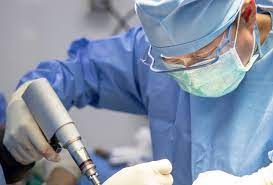
Advancements in Orthopedic Surgery: Enhancing Mobility and Quality of Life
Orthopedic Surgery: Restoring Mobility and Quality of Life
Orthopedic surgery is a specialized branch of medicine that focuses on the diagnosis, treatment, and prevention of conditions affecting the musculoskeletal system. This intricate system includes bones, joints, ligaments, tendons, muscles, and nerves that work together to support the body’s structure and enable movement.
When individuals experience injuries or conditions that affect their musculoskeletal system, orthopedic surgery may be recommended to restore function, alleviate pain, and enhance their overall quality of life. From fractures and joint replacements to spinal deformities and sports injuries, orthopedic surgeons are highly skilled in performing a wide range of surgical procedures.
Common Orthopedic Surgical Procedures
Joint Replacement: Joint replacement surgery is often performed when joints such as the hip or knee become severely damaged due to arthritis or injury. During this procedure, the damaged joint is replaced with an artificial joint made of metal or plastic components. Joint replacement surgeries have significantly improved over the years, allowing patients to regain mobility and live pain-free lives.
Arthroscopy: Arthroscopy is a minimally invasive surgical technique used to diagnose and treat various joint problems. It involves inserting a small camera called an arthroscope into the joint through tiny incisions. The surgeon can then visualize the joint’s internal structures on a monitor and perform necessary repairs using specialized instruments. Arthroscopic procedures result in smaller incisions, reduced scarring, less pain, and faster recovery times compared to traditional open surgeries.
Spinal Surgery: Spinal surgery aims to treat conditions affecting the spine, including herniated discs, spinal deformities, and spinal stenosis. Surgeons utilize advanced techniques to correct abnormalities and alleviate pain, often through minimally invasive procedures. Spinal surgeries can help improve mobility, relieve nerve compression, and enhance overall spinal stability.
Fracture Repair: Fractures occur when bones break due to accidents or trauma. Orthopedic surgeons use various techniques to realign and stabilize fractured bones, promoting proper healing and preventing long-term complications. Depending on the severity of the fracture, surgical interventions such as open reduction internal fixation (ORIF) may be necessary to ensure optimal recovery.
Choosing an Orthopedic Surgeon
When considering orthopedic surgery, it is crucial to find a skilled and experienced surgeon who specializes in the specific procedure you require. Look for orthopedic surgeons who are board-certified and have extensive training in their field. Additionally, consider their track record of successful outcomes and patient satisfaction.
It is also important to communicate openly with your surgeon about your condition, concerns, and expectations. A good orthopedic surgeon will take the time to listen to you, explain all available treatment options, discuss potential risks and benefits of surgery, and guide you towards making an informed decision about your care.
The Road to Recovery
Orthopedic surgery is just the beginning of a patient’s journey towards recovery. Following surgery, a comprehensive rehabilitation program is often prescribed to aid in restoring strength, mobility, and function. Physical therapy sessions may be recommended to help patients regain muscle strength and joint flexibility while minimizing pain or discomfort.
Patient compliance with post-operative instructions is crucial for successful recovery. This includes adhering to prescribed medications, attending follow-up appointments with the surgeon or physical therapist as scheduled, and actively participating in rehabilitation exercises. By following these guidelines, patients can optimize their recovery and achieve the best possible outcomes.
Orthopedic surgery has revolutionized the treatment of musculoskeletal conditions, allowing individuals to regain their independence and enjoy an improved quality of life. If you are experiencing pain or mobility issues related to your bones, joints, or muscles, consult with an orthopedic specialist to explore your treatment options and embark on a path towards restored mobility and optimal well-being.
Six Essential Tips for a Successful Orthopedic Surgery Experience
- Follow your surgeon’s pre-operative instructions carefully.
- Maintain a healthy diet and exercise regularly to improve your overall health prior to surgery.
- Discuss any concerns or questions you have with your surgeon before the procedure.
- Prepare your home for post-surgery recovery by removing hazards and arranging necessary equipment.
- Follow the prescribed rehabilitation program diligently for optimal recovery and long-term results.
- Attend all follow-up appointments with your surgeon to monitor progress and address any concerns.
Follow your surgeon’s pre-operative instructions carefully.
To ensure a successful outcome and minimize potential risks, it is crucial to follow your surgeon’s pre-operative instructions carefully when preparing for orthopedic surgery. These instructions are designed to optimize your health and well-being before the procedure. They may include guidelines on fasting, medication management, smoking cessation, and any necessary pre-operative tests or evaluations. By adhering to these instructions, you can help reduce the likelihood of complications and ensure that you are in the best possible condition for surgery. Remember, your surgeon’s guidance is based on their expertise and experience, so following their instructions diligently is an essential step in your journey towards a successful orthopedic surgery and a smooth recovery.
Maintain a healthy diet and exercise regularly to improve your overall health prior to surgery.
Maintaining a healthy diet and engaging in regular exercise are essential steps to improve your overall health prior to undergoing orthopedic surgery. A nutritious diet rich in vitamins, minerals, and protein can help strengthen your immune system, promote healing, and provide the necessary nutrients for optimal recovery. Regular exercise, under the guidance of your healthcare provider, can help improve muscle strength, flexibility, and cardiovascular health. By prioritizing a healthy lifestyle before surgery, you can enhance your body’s ability to heal and increase the chances of a successful orthopedic procedure.
Discuss any concerns or questions you have with your surgeon before the procedure.
It is essential to have open and honest communication with your orthopedic surgeon before undergoing any procedure. Take the time to discuss any concerns or questions you may have regarding the surgery. Your surgeon is there to provide you with the necessary information, address your worries, and ensure that you have a clear understanding of the procedure. By discussing your concerns beforehand, you can gain peace of mind, alleviate any anxieties, and make informed decisions about your orthopedic surgery. Remember, effective communication between you and your surgeon is key to a successful surgical experience.
Prepare your home for post-surgery recovery by removing hazards and arranging necessary equipment.
Preparing your home for post-surgery recovery is an essential step in ensuring a smooth and safe healing process. By removing hazards and arranging necessary equipment, you can create a comfortable and supportive environment for your recovery. Take the time to assess your living space and eliminate any potential tripping hazards such as loose rugs or cluttered pathways. Additionally, consider installing handrails or grab bars in areas where extra support may be needed. Arrange essential equipment like crutches, walkers, or shower chairs within easy reach to promote independence and reduce strain during daily activities. By proactively preparing your home, you can focus on your rehabilitation with peace of mind, knowing that you have created a conducive space for a successful recovery.
Follow the prescribed rehabilitation program diligently for optimal recovery and long-term results.
Following the prescribed rehabilitation program diligently is crucial for optimal recovery and long-term results after orthopedic surgery. Rehabilitation plays a vital role in restoring strength, mobility, and function to the affected area. By actively participating in physical therapy sessions, adhering to prescribed exercises, and attending follow-up appointments with the surgeon or physical therapist, patients can maximize their chances of achieving the best possible outcomes. The rehabilitation program is designed to gradually improve muscle strength, joint flexibility, and overall functionality while minimizing pain or discomfort. By committing to the rehabilitation process, patients can enhance their recovery journey and enjoy long-lasting benefits from their orthopedic surgery.
Attend all follow-up appointments with your surgeon to monitor progress and address any concerns.
Attending all follow-up appointments with your orthopedic surgeon is crucial for monitoring your progress and addressing any concerns that may arise after orthopedic surgery. These appointments allow your surgeon to assess how well you are healing, evaluate the success of the procedure, and make any necessary adjustments to your treatment plan. By attending these appointments, you can ensure that any potential issues are identified early on and receive prompt medical attention. Additionally, it provides an opportunity for you to discuss any questions or concerns you may have, allowing your surgeon to provide guidance and reassurance throughout your recovery journey. Remember, regular follow-up appointments are an essential part of optimizing your orthopedic surgery outcomes and achieving a successful recovery.



